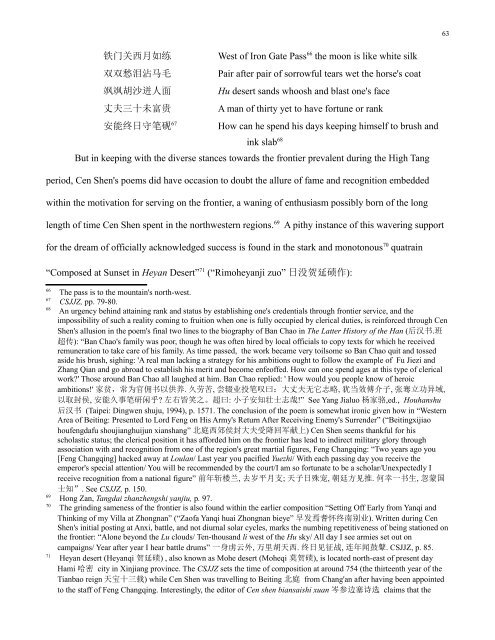View/Open - University of Victoria
View/Open - University of Victoria
View/Open - University of Victoria
Create successful ePaper yourself
Turn your PDF publications into a flip-book with our unique Google optimized e-Paper software.
63<br />
铁 门 关 西 月 如 练<br />
双 双 愁 泪 沾 马 毛<br />
飒 飒 胡 沙 迸 人 面<br />
丈 夫 三 十 未 富 贵<br />
安 能 终 日 守 笔 砚<br />
67<br />
West <strong>of</strong> Iron Gate Pass 66 the moon is like white silk<br />
Pair after pair <strong>of</strong> sorrowful tears wet the horse's coat<br />
Hu desert sands whoosh and blast one's face<br />
A man <strong>of</strong> thirty yet to have fortune or rank<br />
How can he spend his days keeping himself to brush and<br />
ink slab 68<br />
But in keeping with the diverse stances towards the frontier prevalent during the High Tang<br />
period, Cen Shen's poems did have occasion to doubt the allure <strong>of</strong> fame and recognition embedded<br />
within the motivation for serving on the frontier, a waning <strong>of</strong> enthusiasm possibly born <strong>of</strong> the long<br />
length <strong>of</strong> time Cen Shen spent in the northwestern regions. 69 A pithy instance <strong>of</strong> this wavering support<br />
for the dream <strong>of</strong> <strong>of</strong>ficially acknowledged success is found in the stark and monotonous 70 quatrain<br />
“Composed at Sunset in Heyan Desert” 71 (“Rimoheyanji zuo” 日 没 贺 延 碛 作 ):<br />
66<br />
The pass is to the mountain's north-west.<br />
67<br />
CSJJZ, pp. 79-80.<br />
68<br />
An urgency behind attaining rank and status by establishing one's credentials through frontier service, and the<br />
impossibility <strong>of</strong> such a reality coming to fruition when one is fully occupied by clerical duties, is reinforced through Cen<br />
Shen's allusion in the poem's final two lines to the biography <strong>of</strong> Ban Chao in The Latter History <strong>of</strong> the Han ( 后 汉 书 . 班<br />
超 传 ): “Ban Chao's family was poor, though he was <strong>of</strong>ten hired by local <strong>of</strong>ficials to copy texts for which he received<br />
remuneration to take care <strong>of</strong> his family. As time passed, the work became very toilsome so Ban Chao quit and tossed<br />
aside his brush, sighing: 'A real man lacking a strategy for his ambitions ought to follow the example <strong>of</strong> Fu Jiezi and<br />
Zhang Qian and go abroad to establish his merit and become enfe<strong>of</strong>fed. How can one spend ages at this type <strong>of</strong> clerical<br />
work?' Those around Ban Chao all laughed at him. Ban Chao replied: ' How would you people know <strong>of</strong> heroic<br />
ambitions!' 家 贫 , 常 为 官 佣 书 以 供 养 . 久 劳 苦 , 尝 辍 业 投 笔 叹 曰 : 大 丈 夫 无 它 志 略 , 犹 当 效 傅 介 子 , 张 骞 立 功 异 域 ,<br />
以 取 封 侯 , 安 能 久 事 笔 研 闲 乎 ? 左 右 皆 笑 之 。 超 曰 : 小 子 安 知 壮 士 志 哉 !” See Yang Jialuo 杨 家 骆 ,ed., Houhanshu<br />
后 汉 书 (Taipei: Dingwen shuju, 1994), p. 1571. The conclusion <strong>of</strong> the poem is somewhat ironic given how in “Western<br />
Area <strong>of</strong> Beiting: Presented to Lord Feng on His Army's Return After Receiving Enemy's Surrender” (“Beitingxijiao<br />
houfengdafu shoujianghuijun xianshang” 北 庭 西 郊 侯 封 大 夫 受 降 回 军 献 上 ) Cen Shen seems thankful for his<br />
scholastic status; the clerical position it has afforded him on the frontier has lead to indirect military glory through<br />
association with and recognition from one <strong>of</strong> the region's great martial figures, Feng Changqing: “Two years ago you<br />
[Feng Changqing] hacked away at Loulan/ Last year you pacified Yuezhi/ With each passing day you receive the<br />
emperor's special attention/ You will be recommended by the court/I am so fortunate to be a scholar/Unexpectedly I<br />
receive recognition from a national figure” 前 年 斩 楼 兰 , 去 岁 平 月 支 ; 天 子 日 殊 宠 , 朝 廷 方 见 推 . 何 幸 一 书 生 , 忽 蒙 国<br />
士 知 ”. See CSJJZ, p. 150.<br />
69<br />
Hong Zan, Tangdai zhanzhengshi yanjiu, p. 97.<br />
70<br />
The grinding sameness <strong>of</strong> the frontier is also found within the earlier composition “Setting Off Early from Yanqi and<br />
Thinking <strong>of</strong> my Villa at Zhongnan” (“Za<strong>of</strong>a Yanqi huai Zhongnan bieye” 早 发 焉 耆 怀 终 南 别 业 ). Written during Cen<br />
Shen's initial posting at Anxi, battle, and not diurnal solar cycles, marks the numbing repetitiveness <strong>of</strong> being stationed on<br />
the frontier: “Alone beyond the Lu clouds/ Ten-thousand li west <strong>of</strong> the Hu sky/ All day I see armies set out on<br />
campaigns/ Year after year I hear battle drums” 一 身 虏 云 外 , 万 里 胡 天 西 . 终 日 见 征 战 , 连 年 闻 鼓 鼙 . CSJJZ, p. 85.<br />
71<br />
Heyan desert (Heyanqi 贺 延 碛 ) , also known as Mohe desert (Moheqi 莫 贺 碛 ), is located north-east <strong>of</strong> present day<br />
Hami 哈 密 city in Xinjiang province. The CSJJZ sets the time <strong>of</strong> composition at around 754 (the thirteenth year <strong>of</strong> the<br />
Tianbao reign 天 宝 十 三 载 ) while Cen Shen was travelling to Beiting 北 庭 from Chang'an after having been appointed<br />
to the staff <strong>of</strong> Feng Changqing. Interestingly, the editor <strong>of</strong> Cen shen biansaishi xuan 岑 参 边 塞 诗 选 claims that the
















